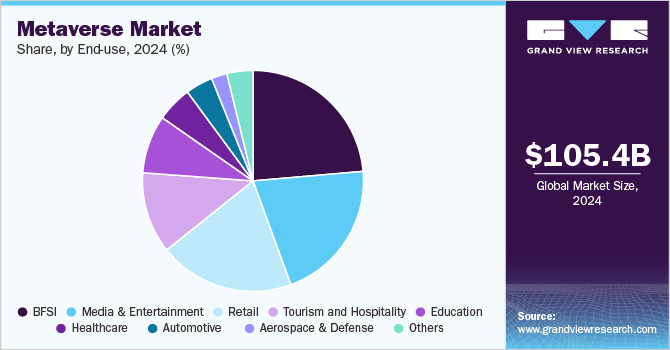Metaverse Market: 5G Connectivity Accelerating Metaverse Accessibility
The global metaverse market is witnessing rapid expansion, fueled by the convergence of AR, VR, MR, and 3D visualization technologies that enable immersive, interactive, and collaborative digital experiences.
The global metaverse market size was valued at USD 105.40 billion in 2024 and is projected to reach USD 936.57 billion by 2030, expanding at a CAGR of 46.4% from 2025 to 2030. The adoption of spatial technologies is transforming how users interact with digital content, creating experiences that seamlessly merge the virtual and physical worlds. This integration is prompting companies to develop immersive products and services that enhance user engagement and bridge the gap between real and digital environments, fueling innovation across diverse industries.
As organizations increasingly design digital twins of physical locations, the demand for virtual land and 3D space design continues to rise. This trend is particularly evident in education, corporate training, and business operations, where virtual environments enable collaborative and experiential learning. The need for customized virtual spaces is driving the advancement of design tools and development platforms tailored to these applications.

For example, in October 2024, Meta partnered with VictoryXR to introduce the first digital twin metaversities in Europe, allowing students at the University of Leeds and the University of the Basque Country to participate in immersive, remote classes that mirror their physical campuses. This initiative has created digital versions of over 130 universities, offering students hands-on learning, simulations, and interactive modules across disciplines such as performance arts and physiotherapy.
Market Drivers
Advancements in augmented reality (AR), virtual reality (VR), mixed reality (MR), and 3D visualization are key factors propelling market growth by enhancing the quality of immersive experiences for users and businesses alike. These technologies support better visualization, simulation, and product prototyping across sectors such as manufacturing, healthcare, and entertainment.
Additionally, the increasing adoption of digital twins and smart factories underscores the industrial relevance of these technologies. Growing investments and partnerships indicate rising interest and strong market momentum. Organizations are prioritizing customer experience enhancement, process efficiency, and cost reduction through immersive tools that support training, remote collaboration, and product design.
The expanding demand for immersive digital experiences in gaming, entertainment, and education further contributes to the strong growth outlook for the metaverse market.
Key Market Trends & Insights
- North America dominates the global metaverse market, accounting for a 42.8% share in 2024.
- The U.S. metaverse industry is witnessing rapid expansion.
- By product, the software segment led the market with a 41.6% revenue share in 2024.
- By platform, the desktop segment captured the largest market share.
- By technology, VR and AR collectively held the largest market share in 2024.
Download a free sample PDF of the Metaverse Market Intelligence Study by Grand View Research.
Market Size & Forecast
- 2024 Market Size: USD 105.40 Billion
- 2030 Projected Market Size: USD 936.57 Billion
- CAGR (2025–2030): 46.4%
- Leading Region: North America
Competitive Landscape
Leading players in the metaverse market include Lilith Games, Meta, Microsoft, NetEase, Inc., Epic Games, Inc., and several others. Companies are focusing on expanding their customer base and strengthening market presence through strategic initiatives, including partnerships, mergers, and acquisitions.
- Epic Games, Inc. contributes significantly to metaverse development through its Fortnite platform, providing virtual spaces for gaming and social interaction. Utilizing the Unreal Engine, Epic creates lifelike 3D environments that enhance metaverse experiences. The company continues to improve interactivity and cross-platform accessibility to make virtual experiences more engaging.
- Meta (formerly Facebook) is advancing the metaverse through its Horizon platform, where users can meet, play, and collaborate virtually. By investing heavily in VR headsets such as Oculus, Meta is enabling deeper immersion in digital environments. The company aims to blend virtual and real-life interactions through applications like virtual offices and social spaces, fostering new ways for people to connect.
Prominent Companies
- Active Theory
- Antiersolutions
- ByteDance Ltd.
- Decentraland
- Epic Games, Inc.
- Lilith Games
- Meta
- Microsoft
- NetEase, Inc.
Explore Horizon Databook – the world’s most comprehensive market intelligence platform by Grand View Research.
Conclusion
The global metaverse market is witnessing rapid expansion, fueled by the convergence of AR, VR, MR, and 3D visualization technologies that enable immersive, interactive, and collaborative digital experiences. As industries increasingly integrate metaverse technologies into education, entertainment, healthcare, and business operations, the demand for virtual environments and digital twins is accelerating. Strategic collaborations, such as Meta’s partnership with VictoryXR, highlight the growing potential of immersive learning and digital engagement. With strong investments and technological innovation driving adoption, the metaverse is set to transform how individuals and organizations interact, learn, and work in the coming decade.